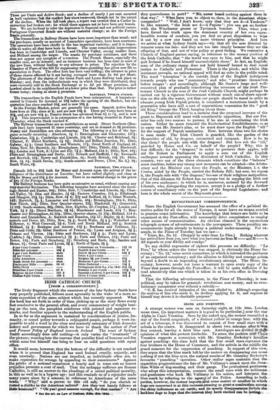IRISH CATHOLIC CHURCH.
[PROM A CORRESPONDENT.]
The lively fragment which the executors of the late' Sydney Smith have very properly published, follows most agreeably in the wake of a more se- rious exposition of the same subject which has recently appeared. What the book has set forth in order of time, picking up as the story flows every fact conducive to the general effect, and every commentary of weight bear- ing 9D the text, the pamphlet reinforces with pointed and sagacious re- marks, and familiar appeals to the understanding of the English public.
In so far as the argument is sustained by considerations of justice, hu- manity, or sound policrtowards a subjugated people, perhaps it were im- possible to add a word to the clear and masterly summary of Irish domestic history and government for which we have to thank the author of Past and Present Policy of England towards Ireland The tract of Sydney Smith accordingly does add nothing—it only varies the "treatment" of the-picture; weaving into the canvass that peculikr kind of humour and fun which none but himself can bring to bear on solid questions with equal effect.
It would seem, however, that the bottom of the difficulty is not reached when it is proved that England has used Ireland cruelly, unjustly, and even unwisely. Nations are not impelled, as individuals often are, to make reparation for wrongs by appealing to their consciences.* Against the pricks of a national conscience a hearty and in some sort an honest prejudice presents a coat of mail. That the unhappy sufferers are Roman Catholics, is still an answer to the pleadings of a sound political morality, in this as well as in a bygone age: and this reminds us of a rejoinder made many years since by a seaman, in reference to' Americans of the same trade. " Why," said a. person to this old salt, " do you cherish so rooted a dislike to the American sailors? Are they not handy fellows at their business?" " Oh yes! good seamen enough, for that matter." " Are
• See the art. ea Law of Nations, Edits. Rev. 1044: they quarrelsome in port?" "'Neoieser hand nothing against them in that way." " What have you to object to, then, in the American ships- oompanies? " " Well, I don't know, only that they are d—d Yankees." In like manner, " the Irish are d—d Papists": you can get no further with the Winchester grocer or Tavistock butcher. Thus, when you have forced the truth upon the dominant country of her own repre- hensible course of conduct, you yet find no great disposition to wipe it out by a now one based on more virtuous principles. And here we arrive at what Sydney Smith says viz. that all the acts dictated by remorse come too late: and they are too late simply because they are the offspring of fear, and not of wise policy or good feeling. We remember a Church of England parson saying, in reference to the uneasy position of the Irish Catholic, that " the world was open to him, and that he might quit Ireland if he found himself uncomfortable there." In fact, an English- man of the ordinary stamp does not hold himself bound to deal equal justice to Catholic and Protestant. There is the pinch; and whilst this sentiment prevails, no rational appeal will find an echo in the public mind. The word " toleration " is the outside limit of the English indulgence towards people who use " mummery," and who " prostrate themselves before images": and accordingly, although Mr. Senior's large and well- conceived plan of gradually transferring the revenues of the Iris' h Pro- testant Church to the uses of the Irish Catholic Church, might perhaps be carried out by a vigorous Government without much out-of-doors opposi- tion on this side the water, yet that our people should be taxed in order to educate young Irish Popish priests, is considered a monstrous insult by a generation who have still a sort of superstitious veneration for the " good old King," George the Third, hanging about them.
These considerations lead to a surmise that the proposed increase of the grant to Maynooth will meet with considerable opposition. But our Pre mier has only two courses to pursue, if he aim at conciliating the Irish nation. Either he must remodel the Ecclesiastical Establishments, so as to carry out Mr. Senior's plan, or he must draw upon the English " till " for the support of Popish seminaries. Now, between these two his choice is soon made. The Irish Church is guarded, like the garden of the Hesperides of old, by dragons, coronetted and rampant. How is he to slay them? the people side with the dragons! Brit how rob the "till," guarded by Hume and Co. on behalf of the people? Why, this is less difficult; for the "dragons," in order to preserve their apples, will aid Sir Robert in Parliament to apply a sum out of the English exchequer towards appeasing the discontent of Irish Catholics. In this country, two out of the three elements which constitute the "balance" must combine, before any strong new measures can be adopted—the Aristo- cracy and the Minister can force the People, as the Minister, i. e. the Crown, aided by the People, carried the Reform Bill; but note, we repeat it, the People side with "the dragons," because of their religious antipathies. Out of this dilemma Sir Robert has no escape but in sopping the Irish out of his own exchequer; in which he is, moreover, assisted by the forward Liberals, who, disregarding the expense, accept it as a pledge of a farther course of conciliatory rule on the part of the Imperial Legislature: and here is the whole secret of the Maynooth grant.


























 Previous page
Previous page